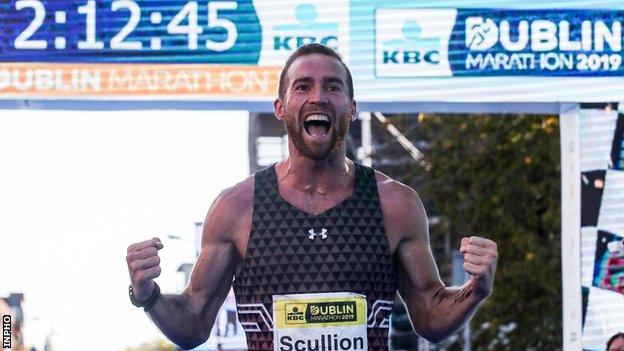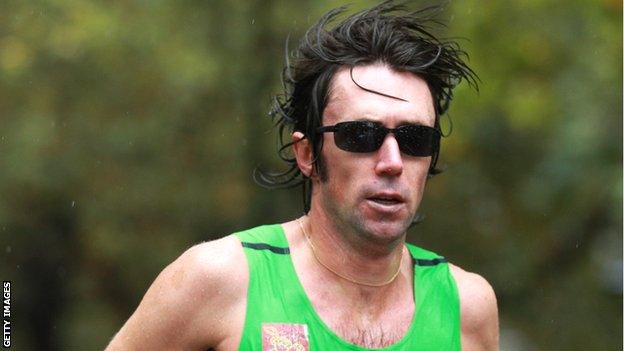Stephen Scullion: Belfast man achieves Tokyo qualifying time with NI record of 2:09.49
- Published

Scullion produced another sensational marathon performance in London
Stephen Scullion became the fastest of Ireland's Olympic marathon qualifiers as he set a new Northern Ireland record of 2:09.49 in London.
The Belfast man's time cut two minutes and three second off his previous best set at this year's Houston Marathon.
His top-five finish in the gold label marathon in Texas did secure the 31-year-old Olympic qualification.
However, it was slower than the Olympic qualifying time of 2:11.30 which he smashed in Sunday's run.
Scullion's London time, which left him 11th overall, moves him to second on the Irish all-time list behind John Treacy's mark of 2:09.15 set at the Boston Marathon in 1988.
There has been some questions marks surrounding the 1984 Olympic silver medallist's time because sections of the Boston course were downhill but Athletics Ireland has confirmed to BBC Sport Northern Ireland that Treacy's mark does remain the Irish record.
Scullion's time is seven seconds faster than Treacy's memorable Los Angeles Olympics performance.
Scullion betters NI record by 20 seconds
The Belfast man's time cut 20 seconds off Kevin Seaward's previous Northern Ireland record set in February at the Seville Marathon.
As world record holder Eliud Kipchoge could only finish eighth with him complaining about a sore ear in the wet and cold conditions, Ethiopia's Shura Kitata took victory in 2:05.41 by outsprinting Kenya's Geoffrey Kipchchumba to win by one second.
Scullion showed his intent right from the off as he reached 10 kilometres in 30:13 - 42 seconds faster than at that point in Houston.
His halfway time of 1:04.12 was a minute and 37 seconds quicker than Houston and when he reached 35km a full two minutes and 13 seconds inside his split from last January, it was clear only a dramatic late blow up was going to deny him a huge personal best.
That didn't happen as Scullion maintained his form brilliantly to remove any doubts about his Olympic spot.

2016 Rio Olympian Mick Clohisey struggled in the second half of Sunday's race as he clocked 2:18.52 - over five minutes outside his personal best
Scullion has long been regarded as a hugely talented distance runner but by his own admission, he has struggled with the demands of training throughout his career.
However over the last year, the Belfast man has come into his own with a series of runs started by his breakthrough second place at the Dublin Marathon in a time of 2:12.01 - which at that stage was the fastest Irish performance since 2002.
Scullion's fellow Northern Irishmen Seaward [2:10.09] and Paul Pollock [2:10.25] moved ahead of him in the Irish Olympic pecking order last winter and spring which did put him under a certain amount of pressure with the likes of Sean Tobin, Mick Clohisey and Hugh Armstrong also hoping to challenge for one of the three marathon spots.
Raheny man Clohisey was also in Sunday's field and he reached halfway in 1:06.31 but suffered in the closing 21 kilometres as he crossed the line in 2:18:52 - over five minutes outside his personal best.
Amid the stresses of lockdown, Scullion announced his retirement in July in a late night tweet which was quickly retracted as he warned about the perils of "drinking and tweeting".
However, his new Northern Ireland half marathon record set at the Antrim Coast event last months as he finished fourth behind Sir Mo Farah suggested he was on track for a strong run in London and he duly delivered on Sunday.
Referring back to the July episode in jocular fashion after Sunday's sensational run, Scullon tweeted: "About to slug about eight pints of Guinness. If I retire about 4am give me a break @BBCSPORTNI".
Mayo-born Sinead Diver finished seventh in the women's race which was won by Kenya's Brigid Kosgei in 2:18.58.
Forty-three-year-old Diver, who represents Australia, clocked 2:27.07, nearly three minutes outside her personal best set in London last year, as the leading women suffered in particularly unpleasant early morning conditions.